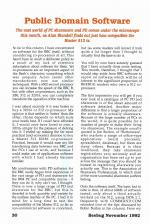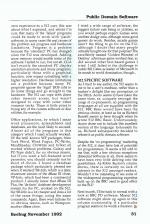
Beebug
 1st November 1992
1st November 1992
Author: Alan Blundell
Published in Beebug Volume 11 Number 6
The vast world of PC shareware and PD comes under the microscope this month, as Alan Blundell finds out just how compatible the Master 512 is.
Public Domain Software
So far in this column, I have concentrated on software for the BBC itself, without considering co-processors at all. This hasn't been so much a deliberate policy as a result of my lack of extensive information about software for them. Yet co-processors are an important aspect of the Beeb's character, something which was uniquely Acorn (some other manufacturers now use similar techniques). With a 6502 second processor you can increase the speed of the BBC B, but with other co-processors, such as the Z80, 512 or 32016, you can completely transform the operation of the machine.
I was asked recently if it was better to buy a 32016 or 512 co-processor. My opinion is that neither is "better" than the other; choice depends on which suits your needs best. If I could have afforded it, I would once have loved to own a 32016, simply for the pleasure of delving into it. I ended up making the far more practical (and economic) decision to buy a Master 512 80186 co-processor. Practical, because it would ease my life transferring data between my BBC and the PCs I use at work, and because I could make use of applications software with which I had already become familiar.
My involvement with PD software for the BBC really began from experience of the vast range of PD and shareware for the IBM PC and compatible micros - if they can do it, why can't we, I thought.
There is now a large range of PD and shareware for the BBC, but this is dwarfed in both quantity and variety by the endless reaches of the PC. I had it in mind for a long time to test the compatibility of the Master 512, so far as non-commercial software is concerned, but (as some readers will know) it took quite a lot longer than I thought to actually find the time to do it.
You will by now have astutely guessed that I have actually done some testing. This month, therefore, I thought that I would step aside from BBC software to report on software which will be of interest to the significant proportion of Beebug readers who own a 512 co-processor.
The first impression you will get if you ever look at a catalogue of PC PD and shareware is of the sheer amount of software detailed. Another major difference is that a larger proportion of the software is actually shareware.
Because of the large number of PCs in the world, it is quite possible for a number of people to make their living via shareware. The example usually quoted is Jim Button, of 'Buttonware', who markets a range of office-type applications (word processor, spreadsheet, database), but there are many others. Because it is their livelihood, they take shareware registrations very seriously and an organisation has been set up to put across the message that you should be honest in registering shareware you actually use. This is the Association of Shareware Professionals, to which most of the more successful shareware authors belong.
Onto the software itself. The basic fact to note is that, of about 60Mb of software tested, only about a third actually worked on the 512, using DOS 2.1, frequently with COMMAND.COM reloaded (one of the tips discussed by Robin Burton in his column). From my own experience as a 512 user, this was about what I expected, and whilst I'm sure that many of the 'failed' programs could be made to work with 'patch' software, in many cases the real causes of the problem are progress and hardware limitations. Progress is a problem because the 'standard" PC has changed since the 512 was developed. Adding more memory would enable some of the software I tested to run, but not all. CGA isn't exactly the standard PC display resolution anymore and many programs, particularly those with a graphical function, now expect something with a higher resolution. Hardware limitations are a problem because many PC programs ignore the 'legal' DOS calls to do some things and go straight to the hardware. The 512 can cope with direct video memory access, but wasn't designed to cope with some other common tricks. There is little point in trying any of the comms software or disc utilities, for example.
Office applications, by which I mean word processors, spreadsheets and databases, are the most likely to succeed. Almost all of the programs in this category which I tried actually worked. Of the well known WP packages, New York Word, Word Fugue, PC-Write, MindReader, ChiWrite and InText all worked without problems. Galaxy and PC-Type didn't, for no obvious reason, but if you want a full-featured word processor, you should certainly not be short of choice. I found a database package which particularly pleased me when it worked: SR-Info, which is a later, shareware version of the dBase III clone, VP-Info, which had been a commercial product. I already knew that dBase III Plus, the "de facto" database development system for the PC, worked on the 512, but SR-Info is a lot cheaper and does a lot of the same things, using the same commands.
Again, there were failures for no obvious reason, such as Wampum, another dBase clone. I tried a wide range of software, the biggest failure rate being in utilities, as you would perhaps expect. Games were another dodgy area, although some good games do work. Besides, arcade games aren't the thing to go for on the 512, although I doubt that many people actually bought one for that purpose! The excellently named Golden Wombat Of Destiny adventure game worked fine, as did several other text-based games I tried. I still failed in the challenge to outdo Bill Gates as leader of Microsoft in its march to world domination, though...
512-Specific Software
As I tried to say earlier, the 512 seems to me to be a user's machine, rather than a hacker's delight like my perception of the 32016. Acorn seems to have taken the same view, as, uniquely amongst the range of co-processors, no programming languages at all are supplied with the 512. BBC Basic would have been the obvious choice, at least as far as Richard Russell seems to have thought when he wrote 512 BBC Basic. Unfortunately, Acorn chose not to include this excellent version of the language: fortunately for us, Richard subsequently decided to release it as public domain software.
Despite the 'no programming' marketing of the 512, it does have lots of potential for programmers. It seems a bit odd to me that, with a few obvious exceptions (Essential Software et al), there seems to have been very little delving into the possibilities. As Robin Burton's column shows, there is certainly no lack of interest in the 512 amongst readers.
Wouldn't it be interesting to see some of the widespread programming expertise built up on the BBC used to good effect on the 512?
Next month, I'll be back to normal with a look at BBC PD software. Master 512 software might show up again in this column occasionally, if a particular program seems to be worth a mention.
This article was converted to a web page from the following pages of Beebug Volume 11 Number 6.



